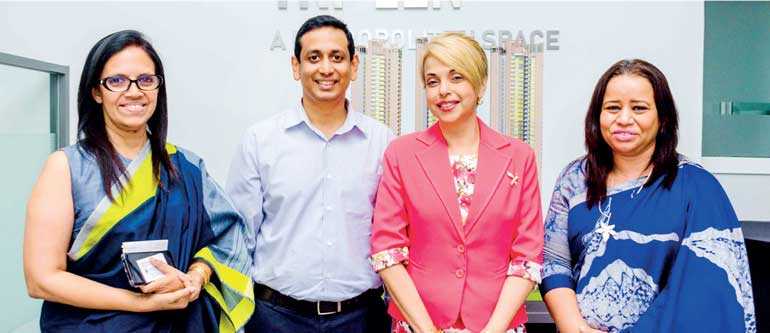Thursday Feb 26, 2026
Thursday Feb 26, 2026
Monday, 1 April 2019 00:00 - - {{hitsCtrl.values.hits}}

From left: John Keells Holdings Executive Vice President and JKP Chief Marketing Officer Roshanie Jayasundera Moreas, JKP Head of Sector Nayana Mawilmada, DFCC Bank Senior Consumer Banking Vice President Gillian Edwards and EY Partner Anoji De Silva
With Sri Lankan women joining the workforce – particularly in the corporate sector – at a higher ratethan ever before, a new opportunity to bridge the wealth gap is emerging as women now turn their eyes to the world of investment.
These were some of the themes explored at a Roundtable Discussion on Financial Independence for Women hosted by John Keells Properties (JKP), featuring a panel of business leaders comprising of John Keells Holdings PLC Executive Vice President and JKP Chief Marketing Officer Roshanie Jayasundera Moreas,JKP Head of Sector Nayana Mawilmada together with DFCC Bank PLC Senior Consumer BankingVice President Gillian Edwards and EY Partner Anoji De Silva.
According to research conductedby JKP, the number of women investing in real estate is on the rise, with 16% of their client portfolio currently comprising of women, as compared with just 9% in 2004.
While this trend is a direct result of increasing overall affluence and a rising per capita income, the increase of women seeking ownership of their own property is also tied to increasing financial independence among Sri Lankan women, and a growing desire to diversify into non-traditional investments.
While these are signs of progress, World Bank research also found that 71% of all assets controlled by women were concentrated in cashand women tend on average to channel as much as 90% of their earnings back into their family – in keeping with established societal norms that place a low priority on the financial independence of women. Women also tend to take time off workto care for family members, which contributes to a lower investment rate among women.
When they do invest, women have tended to prefer traditional investment instruments such as fixed income securities like fixed deposits and bonds that are stable but offer extremely limited returns. However, according to a study by Merrill Lynch, 41% of women later in life wish they had invested differently.
“It is not a lack of risk appetite that deters women from investing, it is a lack of awareness. That is why education into the investment opportunities at hand is vital to closing the investment gap.
“I believe this is a pathway for Sri Lanka to become prosperous, as it becomes more inclusive, and empowers its women to succeed. At the same time, knowledge in today’s world is true power, and there is nothing that can prevent a woman from learning about investments and taking steps to build her financial independence on her own,” stated Roshanie Jayasundera Moreas.